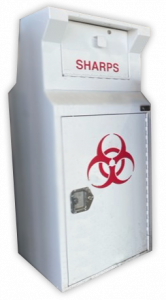FAQ
What if I find a syringe?
Stay calm. Keep children, pets and others away. Bring a sharps container to the location. Use tongs or a gloved hand to pick up the syringe by the middle of the barrel. Drop the syringe into the container, sharp end first. Secure the lid. Remove gloves and wash your hands.
Contact us to schedule a training session or request safe pickup supplies.
Don’t:
- Force a syringe into a container.
- Put fingers inside a sharps container.
- Bend, break or try to recap a syringe.
- Leave a found syringe unattended.
 What is a sharps container?
What is a sharps container?
A sharps container can be heavy-duty plastic, such as a laundry detergent bottle. Tape the lid shut, write WARNING: SYRINGES – DO NOT RECYCLE on the side of the bottle and place it with household trash.
KIND also provides drop boxes where sharps containers can be securely deposited.
Where are sharps drop boxes located?
Drop boxes currently are located at Volunteer Ministry Center, 511 N. Broadway, in North Knoxville. Additional locations will be announced on this website as available.
Who does KIND help?
KIND helps our entire community by providing safe disposal of sharps. The program particularly serves some of our community’s most vulnerable members, including those directly impacted by HIV/HCV, homelessness and substance use.
Why KIND?
KIND provides opportunities to easily return/exchange sharps and reduce the need to share needles, preventing the spread of HIV and hepatitis while also reducing litter. Trained staff also provide supplies, safe pickup and disposal training.
Does Harm Reduction or KIND enable drug use?
No. There is real, tragic harm and danger associated with licit and illicit drug use. Such use is part of our world, and the goal of harm reduction programs is to minimize harmful effects rather than simply ignore or condemn drug users. KIND recognizes that community members who use drugs are the primary agents of reducing the harms of their own use, and KIND staff chooses to offer these services with dignity and compassion.
What are the facts about community-found accidental needle sticks (CFSANS)?
“Needlestick injuries in non-healthcare settings are uncommon and the risk from any needlestick resulting in chronic disease is very small.”
– Commission on Health and Safety and Workers Compensation 2015
“There has never been a reported case of HIV transmission via a community-found syringe accidental needle stick (CFSANS).”
– Journal of Public Health 2013
“The risk of Hepatitis B and C transmission from a CFSANS is “practically negligible.”
– British Medical Journal 2015
How does access to sterile syringes reduce risk?
Public health risks such as outbreaks of HIV or Hepatitis C and individual risks like abscess and wound complications can occur when people who use drugs lack access to sterile syringes. Positively Living & Choice Health Network’s Harm Reduction program provides access to clean syringes and offers sharps disposal to prevent the spread of infection in our community. This also keeps our community safe and reduces litter.
